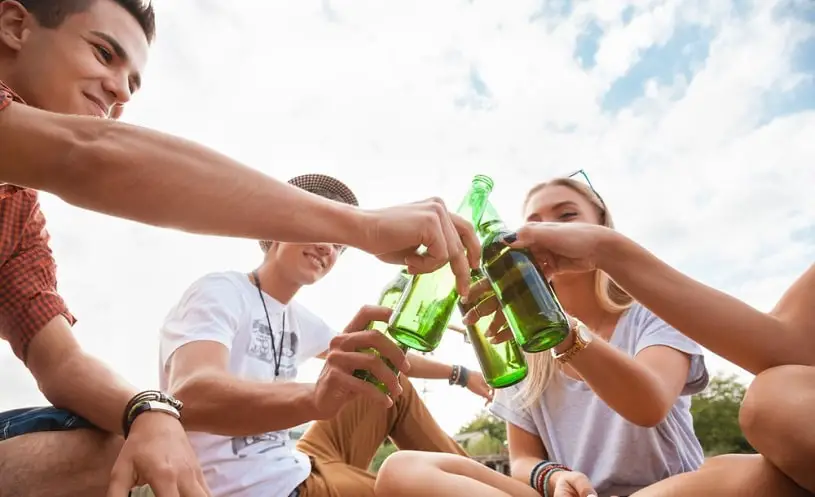A friend asks you to buy alcohol for them, no big deal, right? Think again. What seems like a simple favor can quickly transform into a legal quagmire that leaves you with more than just a guilty conscience. In this riveting blog post, we’ll unravel the hidden dangers of buying alcohol for minors and venture into a world where one impulsive decision can lead to a cascade of life-altering outcomes. Brace yourself as we unravel the truth behind the consequences of buying alcohol for minors and delve into the tangled web of choices we make.
Table of Contents
ToggleUnderstanding the Nuances of Supplying Alcohol to Minors
The act of supplying or furnishing alcohol to a minor encompasses a broad spectrum of actions, each with the potential to land you in hot water.
Imagine this: hosting a house party where alcohol flows freely and turning a blind eye to underage attendees gaining access to the forbidden elixir. Or perhaps placing a tempting alcoholic beverage within arm’s reach of a minor, knowing all too well the inevitable outcome. And let’s not forget about purchasing alcohol and discreetly stashing it away in an underage person’s vehicle. You see, it’s not just about physically handing the alcohol to the minor; even a hint of intention can have legal repercussions in the eyes of the law.
The Hidden Dangers — Alcohol Risks for Minors

The risks for minors involved with alcohol are significant and have wide-ranging consequences. Let’s take a closer look:
1. Young Lives in Jeopardy
Prepare for a startling revelation: Young adults aged 15 to 24 in the United States are confronted with a disheartening decline in life expectancy. Unbelievably, the culprits behind this distressing truth are accidents, suicide, and homicide. Yet, there’s a hidden enemy at play, weaving its destructive web—illicit alcohol and drugs.
2. Zero Tolerance
Possessing an alcoholic beverage alone can lead to arrest and citation for minors. The law considers mere possession as a violation, highlighting the severity of the legal consequences.
3. Strictly Prohibited
Minors and Alcohol – a dangerous combination. No buying, possessing, or sipping; each turns the key to breaking the law. Stay wise, stay clear!
4. Shared Accountability
Sharing alcohol with underage individuals has serious legal repercussions, even if it’s a minor sharing it. And when it comes to responsibility, it’s important to grasp the gravity of enabling or facilitating alcohol availability for minors.
5. Adult Responsibility
Friends or relatives over the age of 21 should be aware that purchasing, giving, or knowingly making alcohol available to a minor is in violation of the law and may lead to charges. Adults must be mindful of their legal obligations and the potential consequences of their actions.
Parties Prohibited from Selling or Supplying Alcohol
When it comes to laws governing the provision of alcohol to minors, a wide range of individuals and organizations are in the spotlight. Their mission? To ensure alcohol remains out of reach for minors. Surprisingly, this prohibition includes even family members. While a few states carve out exceptions for parents in specific situations, most firmly prohibit individuals from providing alcohol to minors altogether.
Beware, though: some states consider hosting a party with easily accessible liquor or permitting a minor to partake in alcohol intended for adults as “supplying” a minor.
4 Penalties for Selling or Supplying Alcohol to a Minor
Providing alcohol to minors carries serious penalties. From legal repercussions and financial burdens to regulatory enforcement, understanding the potential consequences is vital. Let’s explore the four penalties individuals may face when involved in selling or supplying alcohol to minors.
Behind Bars
Supplying alcohol to minors carries a heavy cost – time spent behind bars. Misdemeanors can lead to up to one year in local jail, while felonies result in prison sentences ranging from one to five years. Factors vary, but state laws play a vital role in determining the outcome.
The Watchful Eye of Probation
In the high-wire act of selling or supplying alcohol to minors, probation takes center stage as an alternative to incarceration. Picture walking a tightrope, as misdemeanor probation hovers for six to 12 months, with potential extensions. And for those facing felony charges, the tightrope stretches even further over multiple years. Step carefully, as probation demands regular check-ins with vigilant probation officers and meeting court obligations, but beware, losing balance can send you plummeting straight back to jail!
Fines as Payment
When it comes to misdemeanor convictions for supplying alcohol to underage individuals, the cost can be staggering, varying with the severity of the offense and the state of residence.
These fines can reach a chilling $5,000, although typical penalties fall between $500 and $1,000. Felony fines are even more daunting, surpassing $50,000. As if that weren’t enough, individuals found guilty of violating state alcohol laws may also bear the weight of court costs and attorney’s fees.
License on the Line
Selling alcohol comes with a price – a state liquor license. Yet, when licensed establishments inadvertently or intentionally sell alcohol to minors, the consequences loom large. The state liquor administrative agency wields the authority to suspend or revoke licenses, particularly with repeated violations. This weighs heavily on licensed retailers, who may also face additional penalties like administrative fines for each offense committed.
Fake IDs and Mistaken Ages — Navigating the Gray Areas
In the perpetual struggle between minors and alcohol restrictions, the use of fake IDs reigns supreme. However, the legal landscape surrounding selling or supplying alcohol to a minor is far from black and white. It all hinges on the state laws that govern these situations. Some states enforce strict liability, making sellers accountable regardless of their knowledge of the buyer’s true age. In other states, sellers may find some defense if they diligently request identification that appears genuine. Yet, this defense crumbles if a minor presents a fraudulent ID. The critical factor becomes determining whether the seller had a reasonable belief in the authenticity of the provided identification.
Cheers to Responsibility
As we reach the end of our exploration into the consequences of buying alcohol for minors, it’s clear that the fun diminishes when legal troubles come knocking. Jail time, hefty fines and probation may not be the party you had in mind.
So let’s raise a glass to responsible decision-making and prioritizing the well-being of our youth. By refusing to contribute to underage drinking, we ensure a safer future and protect ourselves from the heavy burdens of legal trouble. Remember, it’s always better to be known as the one who sticks to the law rather than the one who had their night cut short. Keep the party safe, fun, and in compliance with the law. Cheers to responsible choices!

I am a passionate beer connoisseur with a deep appreciation for the art and science of brewing. With years of experience tasting and evaluating various beers, I love to share my opinions and insights with others and I am always eager to engage in lively discussions about my favorite beverage.

















